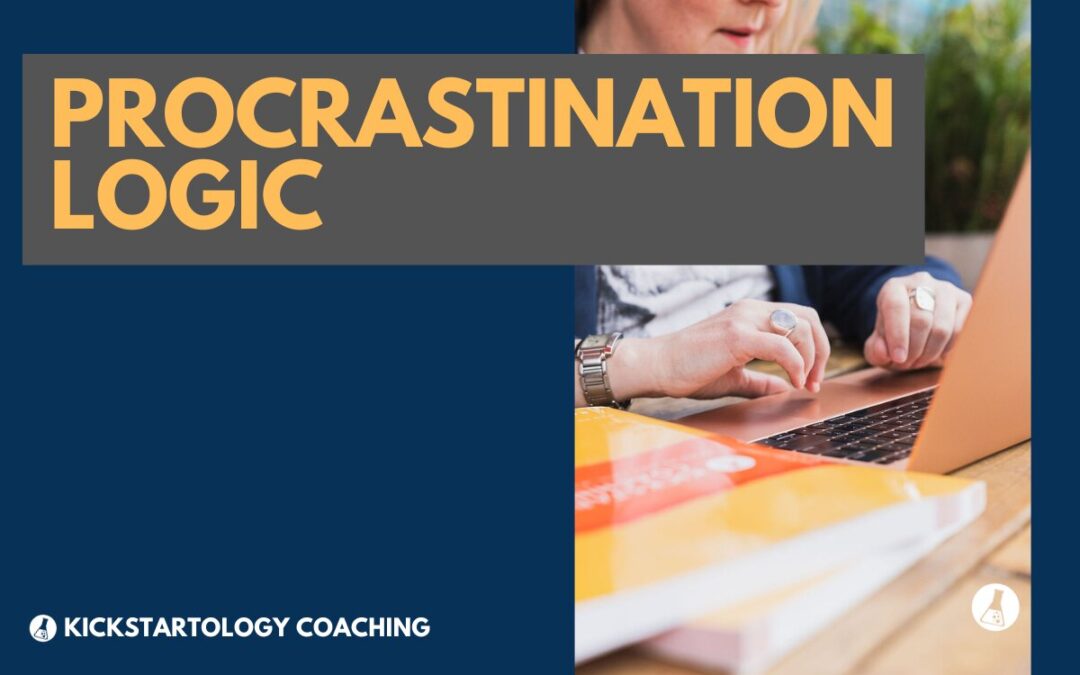“I’ll Do It Tomorrow”… The Logic of Procrastination
This is the perfect time to procrastinate. I know that you can come up with a really good reason to put things off. And I bet that you could get buy-in from others. Procrastination Logic Starts with the simple things we tell ourselves the moment we decide to put it off.
“I’ll do it tomorrow”
“I’ll do it later”
“I’ll start when I have more time”
“I’ll do it when I have more energy”
“It doesn’t matter if I reshuffle and put it off for now”
Which are you? The Six Types of Procrastination
At Kickstartology we call all of that “Tomorrow Thinking”. It all sounds so reasonable when you tell yourself that in your head, and the problem is, we default to believing our thoughts without scrutiny. The bad news is that procrastination is a habit, and repetition makes it stronger. The good news is that procrastination logic does not hold up well to scrutiny.
Reveal Your Procrastination Logic
It gets interesting when you get honest with yourself about your reasoning, your intentions, and your track record. Catching your lies to yourself can take practice because you have to listen for what feels true and separate that from what you want to be true. Start by asking yourself if your procrastination fits into any of the following categories:
Unreasonable Predictions:
Often we put things off and tell ourselves that we will be in the mood to do it later, but that’s almost always to get out of it in the moment. You want the sweet instant relief that comes the moment you decide to procrastinate even though if you think it through, you know that you’re NOT going to feel motivated later.
You’re almost certainly going to want to put it off again, and later you will want to renegotiate with yourself.
Unreliable Good Intentions:
You can have really good intentions and believe that you have good intentions, but if you know that you have a poor track record for following through, your intentions are not reliable.
Perfectionist Fantasy:
Sometimes we put things off waiting for the perfect conditions and it feels like you can’t begin until they happen, but the messiness of imperfection is almost always unavoidable.
Read more: Coaching for perfectionism.
Research and Planning for Clarity and Certainty:
If you don’t know exactly how to do something, what the process will entail, or what the outcome will be it can be tempting to put things off (and do more research and planning) but accepting the discomfort of not knowing is often a part of the process. And uncertainty is guaranteed in life no matter how hard we try to avoid it.
Waiting for the Stress:
This is the most common one, especially for those who have built a solid habit of procrastination and there is overlap with the others. This is when you rely on stress to make decisions, instead of making decisions ahead of time and following through even if you feel stressed. If you are doing this, you put things off UNTIL the stress of not doing them eclipses your desire to avoid them.
Once you see where you are lying to yourself it’s easy to unravel the procrastination logic and the faulty beliefs embedded in “tomorrow thinking”.
Does Your Procrastinating Matter?
Procrastinating isn’t always a big deal, but it can affect your future. Your choices today shape your life tomorrow, including your health, job, skills, money, relationships, and where you live in ten years. So, think about that!
What are you sacrificing in your future just so you don’t have to do something now?
You get to decide what matters to you and what doesn’t based on your values. It boils down to the two big Kickstartology questions: Who do you want to be and how do you want to live? Only you know, so you’re in charge of deciding that.
How to Stop Procrastination Logic
(and get shit done)
If your procrastination isn’t aligned with who you want to be and how you want to live it’s time to change that pattern. As you’ve seen, it’s easy to unravel the procrastination logic, and that’s the first step. Now you have to get into the weeds and figure it out for yourself.
IMPORTANT: There is no perfect app, tool, system, or motivational quote that’s going to fix this for you.
Once you’re being honest with yourself you need to ask yourself what feeling specifically you are avoiding. We procrastinate to avoid the feeling that we predict we will experience. Often this has become so ingrained as a pattern that we aren’t conscious that this is what we are avoiding. Now… are you willing to experience that feeling you’ve been avoiding? It’s almost always easier than you think it will be once you get started. And procrastination feels good, but accomplishment and satisfaction feel even better.
You can start small and build your follow-through muscle over time. It will become a habit and it will change your life.
Steps to Practice
There are four steps to go through to complete a task:
- Clarify: Be clear about what you’re trying to accomplish.
- Prioritize: Decide where to start (for simple things this will be the same as #1).
- Schedule: Decide when exactly you will do the task.
- Do it: Follow through.
Alignment Coaching and Procrastination
Alignment Coaching is about making the shifts in your thinking and your actions to align yourself with who you want to be and how you want to live. I can show you how to find the thinking that keeps you stuck, and teach you the coaching tools to build the skills that are going to take you to a new place. You get to find out what you’re capable of.
What if instead if “I’ll do it tomorrow” you told yourself “Tomorrow I will be happy it is already done”?
P.S. If you want some help figuring out the next part, book a free coaching exploration call. We’ll talk about what’s going on and figure out if it fits. No pressure. Just clarity.
Not ready to talk?
Start with my FREE mini starter course:
KICKSTART: THE FIRST STEP
Make the decision that changes everything else.
Clarity, commitment, and forward motion. Ten minutes a day. Starting now.
How to Manifest a Safari?
The Idea from Nowhere I have a complicated relationship with the whole "manifesting" thing. At the risk of sounding cheesy, I think of it as the little spark of magic that seems to bring things together when you commit to an idea with your full heart without getting...
How to Stop Being Hard on Yourself – ADHD
Don’t have time? The brief: If you have ADHD, being hard on yourself can feel necessary, but it's just a pattern your brain has practiced for years. Self-compassion doesn't mean giving up. It means being honest enough to stop making things harder. Catching it, zooming...
I’m Feeling Untethered, and So Are a Lot of Smart Women I Know
Don’t have time? The brief: Safe mode can become a long-term habit that looks functional but quietly disconnects you from yourself. Drifting often happens gradually, through familiar routines that seem harmless until they flatten everything. Reconnection starts when...







